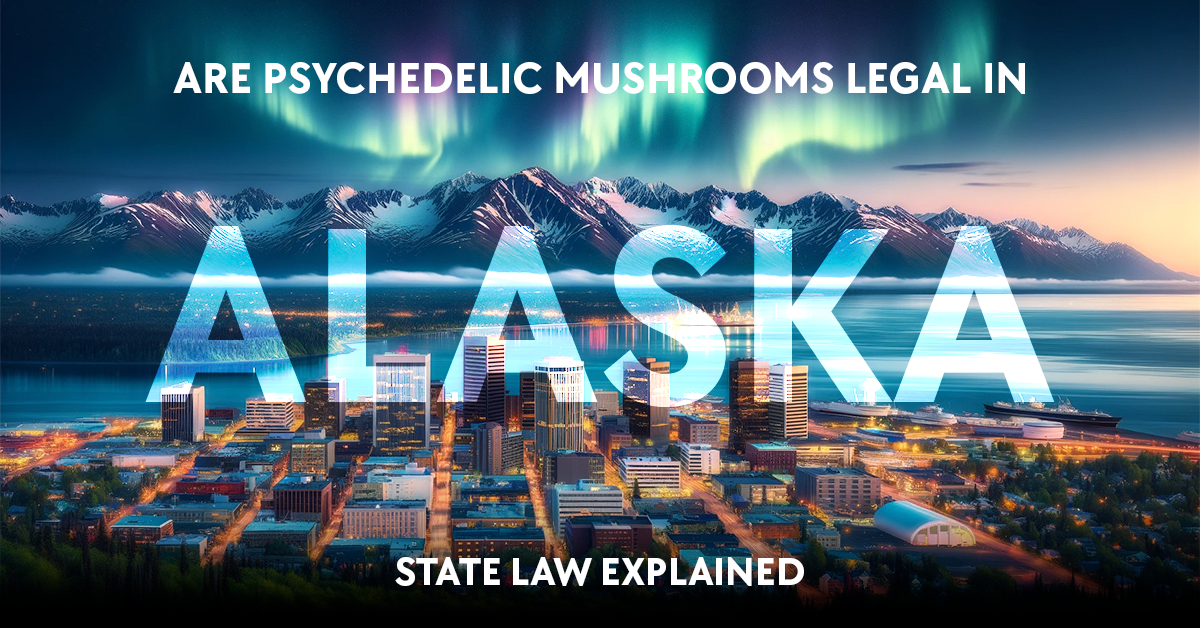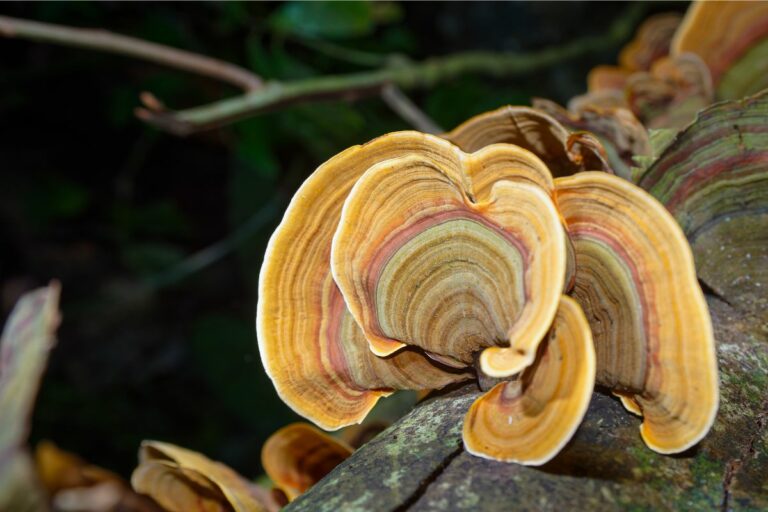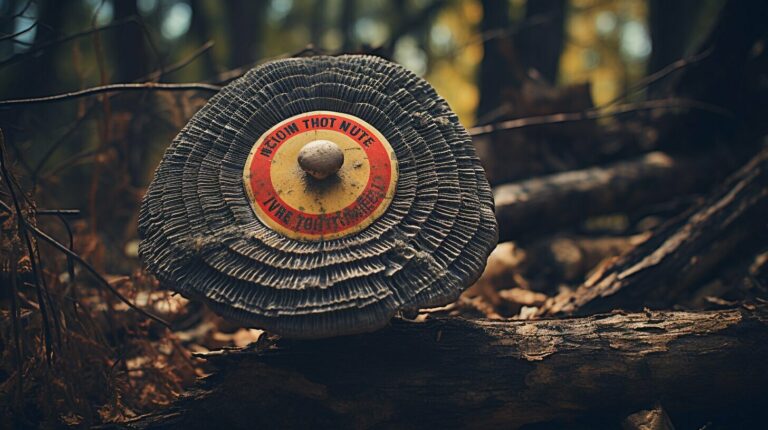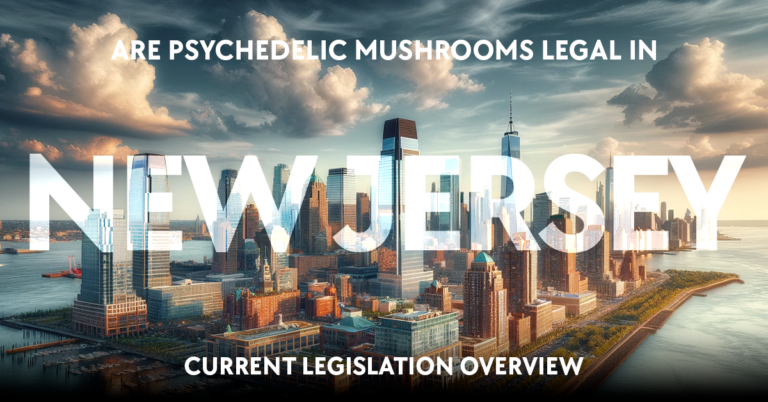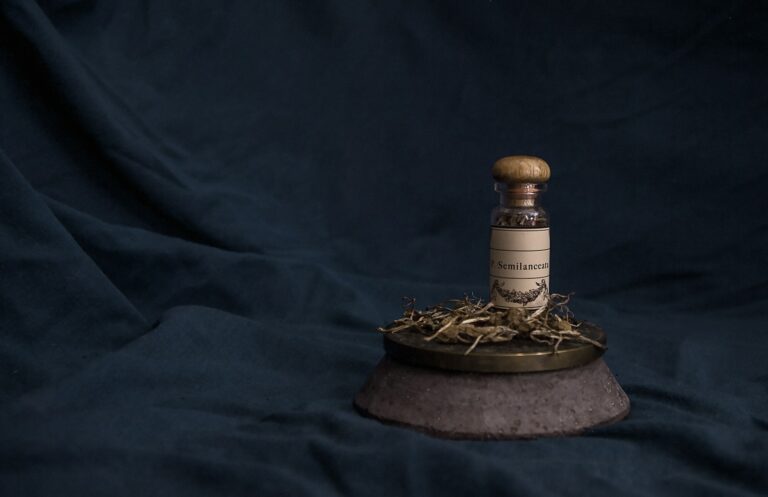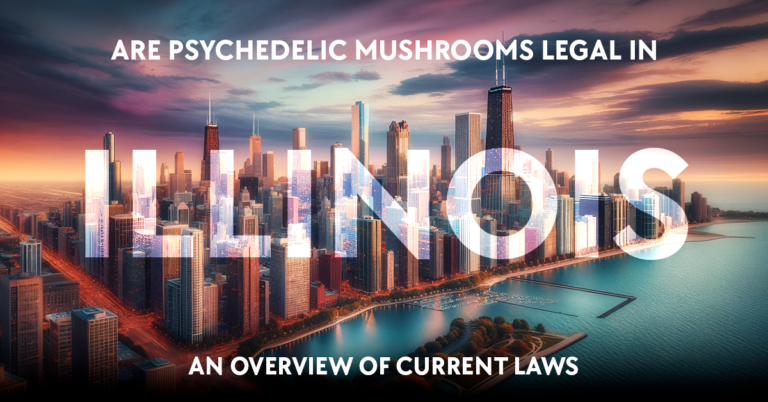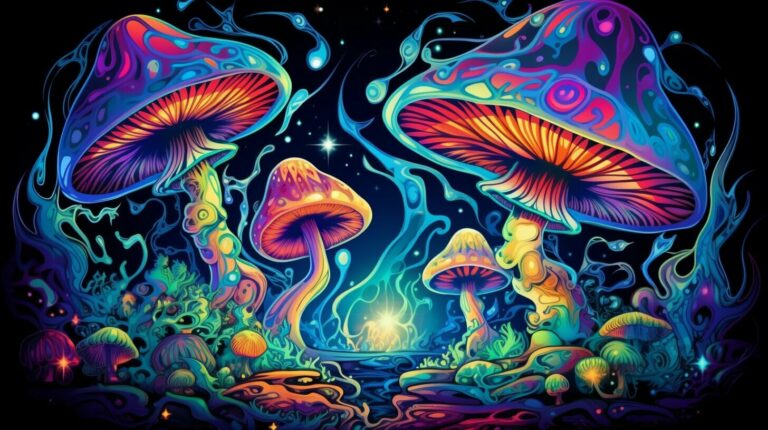When exploring the legal landscape of psychedelic substances in the United States, you might be particularly curious about the standing of psilocybin mushrooms in Alaska. Psilocybin, the psychoactive compound found in certain species of mushrooms, has been the subject of significant legal and scientific discussions. As you look into Alaska’s laws, understanding the legal status of psilocybin mushrooms is crucial since it varies widely across the country, with some states pushing towards reform and others maintaining strict prohibitions.

Your inquiry into Alaska’s position on psilocybin mushrooms reveals a state that often sets its own path in legislation, potentially diverging from federal and other states’ stances on drug policies. While the use, possession, and sale of psychedelic substances, including psilocybin mushrooms, remain illegal under federal law, the approach to enforcement and decriminalization can differ on a state-by-state basis. As it stands, any engagement with psilocybin mushrooms outside of sanctioned scientific research is subject to legal scrutiny in Alaska.
Navigating these waters requires a careful understanding of both current laws and any ongoing legal discussions or legislative efforts concerning psychedelics. Alaska’s frontier spirit and history of progressive policies in areas such as marijuana legalization might influence future deliberations on the status of psilocybin mushrooms. However, for now, they remain a controlled substance within the state.
Legality of Psychedelic Mushrooms in Alaska
Table of Contents
https://www.youtube.com/watch?v=KEubecrqw3I&embed=true
In Alaska, your understanding of the legal status of psychedelic mushrooms — commonly referred to as psilocybin mushrooms — is critical. These substances are classified under Schedule I of the Controlled Substances Act in the United States, which means they’re considered to have a high potential for abuse and no accepted medical use. As such, they are generally illegal to possess, sell, or cultivate.
However, drug laws can evolve, and in some cases, there have been movements towards decriminalization. It’s important to make a clear distinction between decriminalization and legalization: decriminalization reduces the penalties associated with personal use, but does not make the substance legal. Alaska has not decriminalized psilocybin; thus, possession and use could lead to criminal charges and penalties.
Despite the federal classification, local enforcement can vary. Always check the most current state and local laws, as what’s tolerated in one jurisdiction might not be in another. In your case, as a resident or visitor in Alaska, you must recognize that any interaction with psychedelic mushrooms risks criminalization under state drug laws.
Here’s a quick overview:
| Substance | Classification | Legal Status in Alaska | Potential Penalties |
|---|---|---|---|
| Psilocybin Mushrooms | Schedule I | Illegal | Criminal Charges, Fines, Incarceration |
Remember, legal landscapes can shift, and jurisdictions like Denver, Colorado, and Oakland, California, have made moves to decriminalize these substances. Although this might signal a potential for change in Alaska in the future, as of now, the regulation in Alaska aligns with the federal stance, maintaining the illegality of psilocybin mushrooms. Stay updated with any regulatory changes to ensure that you remain compliant with current law.
Decriminalization Efforts in the United States

Throughout the United States, a number of jurisdictions have reformed their laws regarding psilocybin, the psychoactive compound found in what are commonly known as “magic mushrooms.” Decriminalization efforts have varied in scope and have been influenced by a range of local policies and community initiatives.
Oregon stands out as a pioneer, having passed a ballot that legalizes and regulates psilocybin therapy. This is a remarkable milestone, considering psilocybin remains a Schedule I controlled substance at the federal level. However, Oregon’s approach focuses on supervised use within therapeutic settings.
In Colorado, Denver became the first U.S. city to decriminalize the possession and use of psilocybin mushrooms following a 2019 ballot initiative. Here, decriminalization means that the enforcement of laws prohibiting psilocybin use is amongst the lowest priority, although the sale and distribution of the substance remain illegal.
Other cities such as Oakland and Santa Cruz in California, as well as Ann Arbor in Michigan, have followed suit. These cities have passed resolutions that designate the non-commercial possession and use of plant and fungi-based psychedelics as the lowest law enforcement priority.
In Washington, no statewide action has been taken, but Seattle has expressed an interest in the decriminalization of psychedelics. Legal reforms in these jurisdictions typically do not equate to full legal acceptance but are seen as crucial steps toward changing the national conversation around psychedelic substances.
- Oregon: Legalized & regulated psilocybin therapy
- Denver, CO: Decriminalized possession/use
- Oakland, CA: Decriminalized non-commercial possession/use
- Santa Cruz, CA: Decriminalized non-commercial possession/use
- Ann Arbor, MI: Decriminalized non-commercial possession/use
- Seattle, WA: Potential interest in decriminalization
Your understanding of the legal landscape surrounding psilocybin in the United States should acknowledge these nuanced, locality-based movements toward decriminalization.
Federal Classification of Psychedelics

In the United States, psychedelics like psilocybin, LSD, and MDMA are predominantly classified as Schedule I controlled substances. Schedule I is the most restrictive category, which is reserved for drugs that have a high potential for abuse, no currently accepted medical use in treatment in the U.S., and a lack of accepted safety for use under medical supervision.
Psychoactive substances such as psilocybin, found in certain mushrooms, and LSD, which is synthetic, have hallucinogenic properties. These properties can significantly alter your perception, mood, and cognitive processes. Despite their impact on mental states, the federal law currently deems these substances to have no accepted medical value.
Unlike Schedule I, a Schedule II substance is a drug that has a high potential for abuse, with use potentially leading to severe psychological or physical dependence. However, these are considered to have some accepted medical use with severe restrictions. The difference between Schedule I and Schedule II is the acceptance of medical use; MDMA, for instance, is on a path to potential reclassification as it’s currently being researched for its effectiveness in treating PTSD.
The legal landscape surrounding these substances can be complex and continually evolving, especially as research into their therapeutic potential is ongoing. While Schedule I restricted substance status means these substances are illegal under federal law, legal initiatives in certain states might suggest shifting perspectives in the long term, yet federal law remains unchanged as of your current information.
Remember, possession or use of Schedule I substances like psilocybin mushrooms is illegal under federal law, regardless of any differing state laws.
Medical and Therapeutic Use

In Alaska, your interest in the medical and therapeutic use of psychedelic mushrooms, particularly related to mental health conditions like depression and PTSD, is part of a broader discourse on their potential benefits. Now let’s explore the recognized research in this field and the legal framework for therapeutic applications.
Research on Medical Benefits
Research indicates psilocybin, the active compound in psychedelic mushrooms, shows promise for treating a variety of mental health disorders. Studies have suggested that psilocybin therapy can lead to substantial and sustained improvements in individuals suffering from depression, anxiety, PTSD, and addiction. For instance, your exploration into this field may reveal that psilocybin has been linked to reduced symptoms in treatment-resistant depression and as a potential aid for those struggling to overcome addiction, pointing to its significant medicinal potential.
Legal Use of Psychedelics for Therapy
Psychedelics are generally not legal for therapeutic use in many places; however, some regions globally are beginning to acknowledge their possible value in medicine. Although specific legislation in Alaska as of this writing does not permit the use of psychedelic mushrooms, shifts in other jurisdictions could influence future decisions. For example, recognizing medicinal use can pave the way for controlled settings where patients with severe cluster headaches or post-traumatic stress disorder (PTSD) might access these treatments under professional supervision.
State-Specific Regulations and Movements
When considering the legality of psilocybin mushrooms, often referred to as “magic mushrooms,” it’s essential to recognize that laws vary vastly by state. Below is a succinct overview of how several states approach the matter of psilocybin, which could influence movements in other regions such as Alaska.
Decriminalization Efforts:
- California: There’s active discourse around reducing criminal penalties for psilocybin possession.
- District of Columbia: Possession of psychedelic plants, including psilocybin mushrooms, has been decriminalized.
- Oregon: They have decriminalized psilocybin and also passed measures to allow supervised therapeutic use.
Moves Towards Legalization:
- New Mexico: A court ruling has effectively decriminalized the possession of psilocybin for personal use.
- Denver, Colorado: While not representative of Colorado as a whole, Denver decriminalized psilocybin-containing mushrooms in May 2019.
States with Strict Anti-Psilocybin Laws:
- Idaho
- Georgia
| State | Status of Psilocybin Laws |
|---|---|
| California | Decriminalization under debate |
| Idaho | Illegal |
| New Mexico | Decriminalized for personal use |
| New York | No decriminalization |
| Florida | Illegal |
| Georgia | Illegal |
| Michigan | Decriminalized in some cities |
| District of Columbia | Decriminalized |
| Iowa | Illegal |
| Maine | Illegal |
| Minnesota | Illegal |
| New Jersey | Illegal |
| Texas | Illegal |
As of now, Alaska has not joined the decriminalization or legalization movement, maintaining the possession and use of psilocybin mushrooms as illegal substances. However, as with many legal landscapes, changes occur as public opinion and political momentum develop.
To keep abreast of the most current laws in your state, it is recommended that you consult official or legal resources, as local movements and legislation are subject to rapid change.
Personal Use, Possession, and Cultivation
When discussing the legality of psychedelic mushrooms in Alaska, it’s essential to differentiate between the use, possession, and cultivation of these substances. Psychedelic mushrooms, often referred to as magic mushrooms, contain psilocybin, a psychoactive compound. Your understanding of the current laws surrounding these mushrooms is crucial for compliance with state regulations.
-
Use:
- The consumption of psilocybin mushrooms in Alaska is illegal. This encompasses any ingestion of the substance for its psychoactive effects.
-
Possession:
- Having magic mushrooms in your possession is against the law in Alaska. Being caught with these mushrooms may lead to legal consequences.
-
Cultivation:
- Growing psilocybin mushrooms, even for personal use, is considered illegal in Alaska. The law does not make a distinction based on the scale of cultivation.
Interestingly, mushroom spores themselves, which do not contain psilocybin, are not regulated under the same laws. The spores can be legally purchased and possessed, provided they are not intended for cultivation or to produce psilocybin mushrooms.
Your awareness of these guidelines is paramount, as any activities involving psilocybin mushrooms outside of legal boundaries can result in significant legal repercussions. Always stay informed on the most current legislations, as laws regarding psychoactive substances have the potential to change.
Comparison with Other Substances
In Alaska, the legal status of psychedelic mushrooms, containing psilocybin, contrasts with various other substances. Psychedelic mushrooms are classified as Schedule I substances under federal law, which means they’re illegal for all purposes, including medical.
However, in comparison to cannabis, which Alaska legalized for recreational use, psilocybin mushrooms remain illegal. This differs from substances like ketamine, which, while also being a controlled substance, is legally used in medical settings.
Substances such as LSD, DMT, mescaline (derived from peyote), and MDMA are similarly classified to psilocybin mushrooms, being Schedule I drugs with no accepted medical use at a federal level. However, some of these substances are undergoing research for their therapeutic potentials.
On the other hand, ayahuasca, which contains DMT, has been granted religious exemptions in certain contexts, although it’s broadly illegal for recreational and self-medication.
Ibogaine carries potential for treating certain addictions, but like psilocybin, it’s not legally accessible for this purpose in Alaska. It remains a non-approved substance across the United States.
The legal status of peyote is complex; Native American religious practices are granted certain legal protections for its use, despite the active ingredient, mescaline, being a Schedule I substance.
For clarity, here’s how some of these substances compare:
- Psilocybin Mushrooms: Illegal (Schedule I)
- Cannabis: Legal for recreational use
- Ketamine: Controlled but used medically
- LSD/DMT/Mescaline (Peyote)/MDMA: Illegal (Schedule I), with some ongoing research into therapeutic use
- Ayahuasca: Broadly illegal, with exceptions for religious use
- Ibogaine: Illegal, potential for medical use in addiction
- Heroin: Illegal (Schedule I), no medicinal use
- Ecstasy/Molly (street names for MDMA): Illegal (Schedule I), with some approved studies for therapeutic use
In essence, each substance carries its own legal implications and potential therapeutic benefits, with psilocybin mushrooms presently remaining on the more restricted end of the spectrum in Alaska.
Public Health and Safety Considerations
When considering the legal status of psychedelic mushrooms in Alaska, it’s important for you to understand the implications for public health and safety. Psychedelic mushrooms can have medicinal properties, potentially aiding in the treatment of some mental health conditions, but they also carry the risk of addiction and other adverse effects.
Medicinal Use
- Clinical studies suggest controlled use of psilocybin can help with specific mental health issues.
- Parameters for medicinal use are not well-defined in the legal context, possibly leading to unregulated self-medication.
Possession and Penalties
- Possession of psychedelic mushrooms, even in small amounts, may lead to legal repercussions.
- Penalties can include fines or imprisonment, influencing personal and community safety.
Degree of Danger and Enforcement
- The degree of danger associated with psychedelic mushrooms is under debate, yet improper use can lead to health risks.
- Law enforcement may prioritize cases based on the perceived threat to public health.
Sale and Fines
- Selling psychedelic mushrooms can incur significant legal fines and penalties.
- Unregulated sale may compromise the safety and quality of the substance, creating health risks.
Your awareness of the laws surrounding psychedelic mushrooms in Alaska can help mitigate personal and community risks. Responsible knowledge and behavior regarding these substances are key for your safety and compliance with legal standards.
International Perspectives and Trends
When you consider the legality of psychedelic mushrooms, international views vary widely. Different countries have taken unique stances on the legal status of psychotropic substances, especially those containing psilocybin.
In the Netherlands, for example, “magic truffles,” which contain psilocybin, are legal and available for purchase. On the contrary, the cultivation and sale of psychedelic mushrooms themselves have been banned since 2008. This illustrates an interesting distinction within legal frameworks concerning psychoactive compounds in various parts of the mushroom.
Moving to South America, countries like Brazil have no explicit laws banning psilocybin mushroom spores, rendering them quasi-legal. However, this does not imply open freedom, as the extraction or sale of psychedelic substances from these spores may still fall under the control of broader narcotics laws.
In Jamaica, psychedelic mushrooms are not specifically prohibited by law, which has led to the island becoming a destination for those seeking legal psychedelic experiences.
Across the pond, the United Kingdom has a stricter approach, with psilocybin mushrooms classified as a Class A drug, making both their sale and possession illegal.
The trend of decriminalization and legalization, particularly in the United States, is notable in certain jurisdictions. For instance, Denver, Colorado, and Oakland, California, have decriminalized the possession of psychedelic mushrooms. Though it’s essential to note that decriminalization does not equate to legal commercial availability or use, it reduces the legal repercussions associated with small amounts.
Internationally, the push for decriminalization and medicinal research into psychedelics is gaining momentum, influencing laws and societal perceptions. As legal landscapes evolve, it’s vital to stay informed about the regulations specific to each country or region.
Legislative Changes and Proposals
Legislative momentum concerning psychedelics has grown across the United States, and you may wonder what steps have been taken toward legalizing or decriminalizing psychedelic mushrooms, specifically in Alaska. In recent years, numerous legal developments have taken place, not just in Alaska but also in other states like Colorado, Oregon, Vermont, and Massachusetts, which could influence future legislative proposals.
In the realm of decriminalization, certain jurisdictions have initiated changes to lower the penalties associated with psychedelic substances. For example, Denver, Colorado, became the first U.S. city to decriminalize psilocybin mushrooms in 2019. Following closely, Oregon passed a ballot measure in 2020 to decriminalize the possession of small amounts of all drugs, including psilocybin, and further established a framework for its regulated use.
While Alaska has not specifically decriminalized psilocybin mushrooms, the state has shown a progressive approach to other substances. For instance, Alaska was among the first to legalize cannabis, setting a precedent for shifts in drug policy.
- Oregon: Regulatory frameworks are being built following Measure 109, which allows individuals to access services involving the therapeutic use of psilocybin.
- Colorado & Vermont: Active discussions and legislative proposals have addressed the decriminalization of psychedelics.
- Massachusetts: Bills have been introduced that could lead to policy changes.
You should track your state’s legislative updates to stay informed as laws and regulations evolve. The landscape of psychedelic policy is dynamic and could hint at potential reforms to come, including within Alaska. While no specific bills have passed regarding psychedelic mushrooms in Alaska as of this writing, the trends in other states could inspire similar actions there.
Psychedelic Culture and Societal Views
In exploring the legal status of psychedelic mushrooms, or magic mushrooms, in Alaska, you’ll find a spectrum of societal views that stem from diverse cultural perceptions and historical contexts. Psychedelics, a group of substances including psilocybin—the active ingredient in shrooms—are known for inducing profound changes in sensory perception, mood, and thought patterns.
- Prohibition Era: This period instilled a cautionary stance towards psychoactive substances, including hallucinogenic mushrooms. Despite this, recreational use has persisted, suggesting a cultural undercurrent that defies strict legal frameworks.
- Emerging Acceptance: Recent dialogues have indicated a shift in cultural perception, where the potential therapeutic benefits for conditions like existential anxiety are discussed. Such uses are gaining traction in the broader conversation about psychedelics.
| Cultural Element | Impact on Legal Perception |
|---|---|
| Recreational Use | Contributes to controversy |
| Hallucinogenic Nature | Raises safety concerns |
| Medicinal Research | Supports legislative changes |
Your understanding of psychedelic culture is incomplete without recognizing the duality of its character: one part rooted in counterculture and liberation; the other tied to science and wellness. This duality impacts how society views the legalization of psychedelics, including magic mushrooms, in Alaska.
You should note that while some communities view psychedelics as tools for personal growth and spiritual exploration, others may hold onto the stigma born out of decades of prohibition. The evolving legal landscape reflects this dichotomy, highlighting how societal views continue to sway the tides of legislation concerning psychedelic substances.
Conservation and Biodiversity
In Alaska, the conservation and biodiversity of indigenous species, including psychedelic mushrooms like Psilocybe cyanescens, hinges on understanding their unique ecological roles and the necessity to preserve them.
Ecology of Psilocybin Mushrooms
Psilocybin mushrooms flourish in the diverse ecosystems of Alaska, with Psilocybe cyanescens being one of the known indigenous species. These mushrooms usually grow on decaying wood and are integral to the nutrient cycle within their habitats. The Gymnopilus spp., another group of psychedelic mushrooms, also share this ecological niche. The ecology of these species contributes to biodiversity by decomposing organic matter and providing food for a variety of insects and other organisms.
Conservation of Indigenous Species
The conservation of these indigenous species is critical, as they play specific roles in the habitats they populate. The primary conservation concerns for psilocybin mushrooms like Psilocybe cyanescens and Gymnopilus spp. include habitat loss and environmental changes that could disrupt their growth cycles. Protecting the Alaskan wilderness ensures these psychedelic species continue to contribute to the ecological balance and maintain biodiversity.
Legal Implications for Tourists and Non-Residents
When traveling to Alaska, it’s crucial for you as a tourist or non-resident to understand the legal landscape concerning substances like psychedelic mushrooms. As of the knowledge cutoff in 2023, psychedelic mushrooms remain illegal in Alaska, as they are classified under Schedule I controlled substances both federally and by Alaskan law. This classification means possession, sale, or cultivation of psychedelic mushrooms carries legal penalties.
In Alaska, any drug-related conviction can have serious consequences. If you are caught with psychedelic mushrooms, you may face criminal charges, which could include fines and even imprisonment. Here is a quick breakdown of possible charges:
- Simple Possession: This may result in fines and jail time, the severity of which typically increases with the quantity found.
- Intent to Distribute: This is a more severe charge, reflecting the law’s harsher stance on distribution as opposed to possession for personal use.
While some locations in the United States have taken steps toward decriminalization, Alaska has not yet moved in that direction for psychedelic substances. Therefore, while Alaska’s wild and scenic landscapes might intrigue you, carrying or consuming psychedelic mushrooms exposes you to significant risk from law enforcement encounters.
As a visitor in Alaska, you are subject to the same drug laws as residents, so it’s essential to abide by them:
- Be Informed: Always check the most recent laws regarding controlled substances.
- Exercise Caution: Even small quantities of illicit substances can lead to legal issues.
- Stay Legal: Opt for legal activities to enjoy Alaska’s natural beauty without legal repercussions.
Future Outlook and Research Directions
When you consider the legal landscape for psychedelic mushrooms in Alaska, it’s important to monitor evolving legislation and scientific progress. Your awareness of changes can inform both your knowledge and any potential advocacy efforts.
Recent Trends:
- Decriminalization: Some regions have decreased legal penalties for possession of psychedelics, which could signal shifts in public health priorities.
- Medical Research: Studies, like those on Frontiers in Pharmacology, are exploring psychedelics for mental health treatment.
Potential Changes in Legislation:
- Psychedelics: Wider medical acceptance could lead to legal reforms.
- Therapeutic Use: Scientific evidence may support policy adjustments specifically for therapeutic use.
Implications for Research:
- Psychoactive Compounds: Expansion of research into psychoactive substances might uncover new medicinal uses.
- Public Health Policy: Research could inform policies that balance public health with individual freedoms.
Guidelines for Future Research:
- Efficacy in treatment of mental health disorders.
- Long-term safety and risk profiles.
- Public health implications and benefits.
Keeping Informed:
- Stay updated on legal discussions and scientific analyses to understand the potential for medicinal use in therapies.
Remember, while currently, psychedelic mushrooms remain illegal in Alaska, the trajectory for research and possible decriminalization or legalization trends could alter that status, especially as new therapeutic potentials are discovered.
Educational Resources and Harm Reduction
When exploring the landscape of psychedelic mushrooms in Alaska, it’s crucial you have access to reliable educational resources. These resources aim to provide comprehensive information on the potential benefits and risks associated with psychedelic use. Quality education on psychedelics typically includes the history, cultural context, and current scientific research regarding their therapeutic potential for mental health and addiction treatment.
Harm Reduction is a public health strategy designed to minimize the negative consequences associated with drug use. The approach is non-judgmental and emphasizes safety for individuals who choose to use substances such as psychedelic mushrooms. It includes a range of policies, programs, and practices. Here are some components of harm reduction that might be relevant for you:
- Safe Use Information: Guidelines on dosages, effects, potential drug interactions, and health precautions.
- Psychedelic Use Education: Knowledge about the expected experience, including how to handle challenging psychological reactions, sometimes known as “bad trips.”
- Support Services: Including “trip-sitting” services or psychedelic crisis intervention, which provide a supportive presence during the use of psychedelics.
Here’s a concise table on educational and harm reduction practices:
| Educational Component | Harm Reduction Practice |
|---|---|
| Scientific Research | Safe Use Guidelines |
| Cultural Context | Supportive Services |
| Legal Considerations | Crisis Intervention |
When it comes to legality, as of the last update, psychedelic mushrooms remain illegal in Alaska, including but not limited to Psilocybe species. It’s essential to familiarize yourself with the local laws to fully understand the legal context surrounding their use. For more details on the current legislative framework, consider reading up on the Hallucinogenic botanicals of America.
Summary and Key Points
Legality of Psychedelic Mushrooms in Alaska:
- In Alaska, psilocybin mushrooms, commonly considered psychedelic, are not legal for recreational use.
- They are classified as a Schedule I substance under United States federal law, indicating a high potential for abuse and no accepted medical use.
- Despite federal classification, movements for the decriminalization of psychedelics have been gaining ground in various states.
Current Status in Alaska:
- As of now, there have been no successful initiatives to decriminalize or legalize psilocybin in Alaska.
- Possession, cultivation, and distribution remain illegal and penalties can be severe.
Medical Considerations:
- While not legal in Alaska, research into psilocybin as a medical treatment has shown promise in other parts of the United States.
- Clinical trials have been exploring the use of psilocybin for conditions such as depression and PTSD.
Navigating the Law:
- It’s imperative you remain informed on state and federal regulations for up-to-date legal status.
- Any changes to the law would be enacted through the state’s legislative process or via ballot initiatives.
Remember, the information provided here is meant to inform you about the legal landscape surrounding psychedelic mushrooms in Alaska. Always verify and stay current with Alaska’s laws and regulations regarding controlled substances.
Frequently Asked Questions
Before exploring the specifics, it is crucial to understand the nuances of state laws as they pertain to psilocybin mushrooms in Alaska.
What is the current legal status of psilocybin mushrooms in Alaska?
Psilocybin mushrooms are classified as Schedule I controlled substances in Alaska, making their possession, sale, and manufacture illegal under state law.
Can individuals grow psilocybin mushrooms for personal use legally in Alaska?
No, growing psilocybin mushrooms for any use, including personal, is illegal in Alaska due to their Schedule I classification.
Are there any legal consequences for possessing psychedelic mushrooms in Alaska?
Yes, the possession of psychedelic mushrooms is a violation of state law in Alaska, and it can lead to serious legal consequences, including fines and imprisonment.
Has there been any recent legislative action regarding the decriminalization of psychedelic mushrooms in Alaska?
There is currently no legislative action in Alaska that indicates an imminent change in the legal status of psilocybin mushrooms regarding their decriminalization.
What are the potential penalties for distributing psilocybin mushrooms in the state of Alaska?
Distributing psilocybin mushrooms in Alaska could result in felony charges, significant fines, and lengthy prison sentences due to their Schedule I drug classification.
Is it legal to use psilocybin mushrooms for medical or therapeutic purposes in Alaska?
As of now, psilocybin mushrooms are not legal for medical or therapeutic use in Alaska, and no exceptions are made for such purposes.

